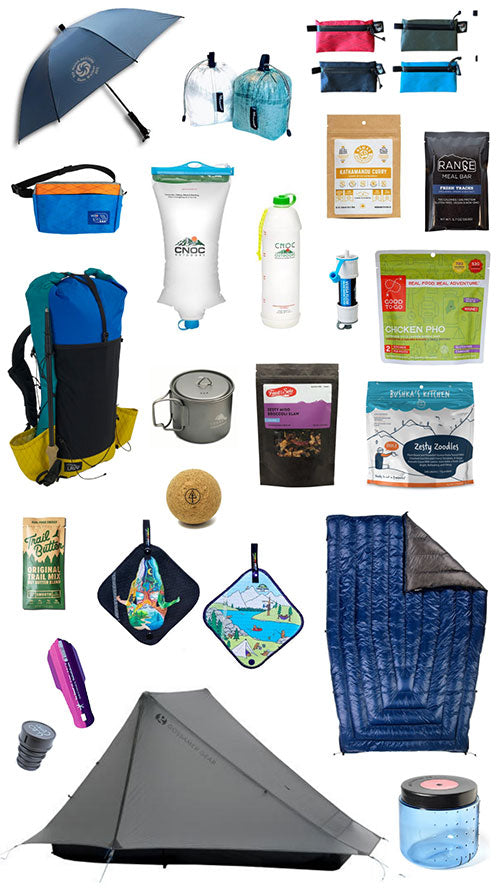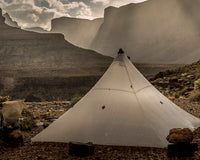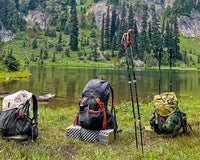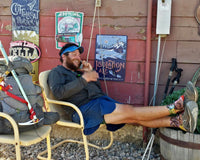
Do we shape our words, or do our words shape us?
That might strike you as an odd question to stumble across when poking around an ultralight backpacking website. But we all know that as the miles unspool ahead of us and those piggies start aching, our minds begin fixating on unusual things.
For some, it’s a preoccupation with the Taylor Swift discography. For others, it’s a compulsive need to rank every slice of pizza they’ve ever eaten. Still others of us can’t help but call up our most embarrassing moments and relive them over and over again.
In case you’re wondering, I’m in all three categories. But since I don’t particularly enjoy recalling how I once took a date to a movie about a haunted tooth fairy — and Taylor’s next album is *checks watch* at least thirty seconds away — I try to keep my mind occupied with other things.
One of the things I think about is words.
Consider the shared lexicon of outdoor adventure. Aficionados of outdoor sports tend to cross-pollinate — if not at the trailhead, then at the very least, wherever the IPA is flowing and the Carhartt beanies are plentiful. So while different sports have different lingos, we are all crushing it, super-stoked, shredding the gnar, slaying, getting it, and sending.
Basically, our shared vocabulary centers around how awesomely we accomplish our various outdoor sports. It seems like we are always conquering, always finding a way to emerge victorious even when we don’t reach the top of a mountain. There is a violence inherent in the language that feels more reflective of our species' troubled past than the flow we all claim to be seeking. It’s a strange brew of Age-of-Exploration entitlement varnished with a groovy California surfer cadence.
We talk about ourselves in relation to the outdoors like we are the masters of this planet instead of strange monkeys clinging desperately to its surface, our word choices helping us forget that for all our hard-earned skill and graceful, gravity-defying balancing acts, the wild is a powerful, potent force that can snap us in two at any moment.
And that strikes me as a bit — I dunno — strange at minimum and dangerous when taken to its logical extremes. Perhaps even at odds with what we ultimately want to accomplish in our human-powered adventures — coming back home alive, and coming back home fundamentally — dare I say spiritually — changed.

Water and Glass
If you spend enough time in the mountains and woods, you’ll be faced with a choice. Turn around or keep going.
The specifics will change from scenario to scenario. Ride the lift to the top of the hill with your more experienced friends or stay on the blue runs you know you can handle. Try to sneak over a Colorado pass in July with a thundercloud incoming, or play it safe below the tree line and lose a few hours of hiking time. Sneak a few more seconds underwater past your dive watch’s alarm, or head for the surface.
Turn around, or keep going.
Those of us who are attracted to outdoor pursuits in part because they are difficult (and there are many of us) have to fight the urge to keep going past the point of reason and safety. It’s an extremely well-documented phenomenon in the annals of outdoor adventure, from guides on Everest shepherding well-paying dentists up into the death zone to polar explorers ignoring carefully planned turnaround points and starving to death as a result. Note that Age of Exploration again — when we borrowed their language, we inherited their folly.
We’ve all done stupid stuff in the mountains because of external and internal pressures. Hopefully, most of us come out the other side no worse for the wear. But accidents in the wild are a numbers game, and the more you make poor decisions, the higher the likelihood of reaping what you sow.
Risk management is all about reducing those percentages to something you can live with. And that spot on the graph is different for everyone. The problem is not where the spot is; the problem is that almost everybody blows right by their own self-imposed limits.
All of this brings me back to “coming home alive.”
The language we use to describe our interactions with the mountains seems at odds with helping our brains make good decisions. It’s hard to look at a storm far over the horizon and say, “better safe than sorry,” when what you want to say is, “crushed it!” when you upload your trail run to Strava.
We choose the language we use to describe the world and our interactions with it. We shape the words and put them into the world, but in turn, those words shape us right back.
Human beings are mostly soggy sacks of water and empty space, after all. Water and air only have shapes when poured and contained, and our language is the glass that shapes us. To tell your mind you have conquered a mountain when in reality, what you have done is survived a mountain due to a difficult-to-parse blend of skill, timing, and pure luck is to put your body in more peril than it needs to be.

To Stand In Awe
Don’t get me wrong. I’m as allergic to new-age woo as I am to the strange British-Empire-by-way-of-California language and cadence of the standard ultra-stoked outdoor bro. Mountains don’t cradle you lovingly to their snowy bosoms any more than they lay down submissively for a good old-fashioned flag planting.
Mountains don’t care about your childhood trauma or your depression, and venturing up into them with bare feet and a cross-body satchel because “the land will provide” is not a viable way to stay alive on their flanks.
Reverence and respect, then, is the middle path, at least to my mind. To approach an adventure in the wilderness not with the language of victory and defeat, violence and colonialism, nor with the softer but equally useless (and unsafe!) vocabulary of new-age mysticism and romanticism.
Respect means we’re aware of just how unlikely it is for apes with backpacks and delusions of grandeur to totally crush anything that could bury us under ten tons of stone if one pebble shifts in the wrong way. Reverence means we appreciate the inherent spirituality of wild places and sweeping vistas while still remembering that stepping on a rattlesnake is likely to cause issues, even if we do consider ourselves “one with nature.”
When we revere the wild places we venture into, rather than reducing them to pure objectives like an explorer or tools for our mental health like a TikTok influencer — that’s when we find the best blend of adrenaline and spiritual fulfillment.
Not because there’s anything wrong with being stoked, but because we all have less to control than we’d like in our lives. But we can choose our words, choose our shapes.
And it’s a beautiful thing to be shaped like something that stands in awe.
Andrew Marshall tried his hand at documentary filmmaking, dorm-parenting 30 middle schoolers at a boarding school, and professional wedding photography before washing up on the rocky shores of outdoor journalism. Since then, he's written for Blue Ridge Outdoors, BikeRumor! ExplorersWeb, The Inertia, GearJunkie, Backpacking Light, and other web and print outlets. He's won multiple Excellence in Craft awards from the Outdoor Writers Association of America in such diverse disciplines as writing, photography, and illustration. A committed dilettante with a tendency to be interested in just about everything, Andrew is also a published poet, a chess player (trail name: "Pawn"), an experienced long-distance backpacker, a mountain biker/bikepacker with a tendency to fly over the handlebars, and an extremely slow trail runner. Based in Western North Carolina, he enjoys hanging out with his two-year-old, eating biscuits and gravy, and checking out way more library books than one person could possibly read in three weeks. You can find more of Andrew's published writing and watercolor illustrations here.
















1 comment
Scott
I really appreciate this article and paying attention to the language we use. Thank you.